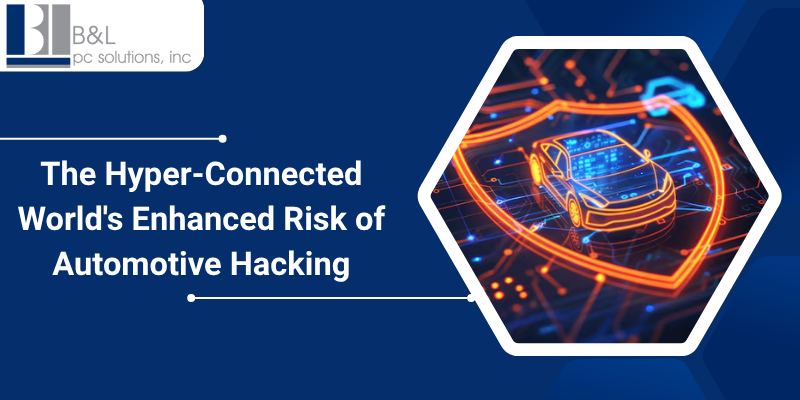
Automobiles have undergone significant changes in the last ten years. There is technology associated with every aspect of car driving and management. And what has it become now? A prime target for hackers. Yes, the same people who go after banks and steal credit card numbers are now interested in your vehicles.
The Technology Inside Modern Vehicles Has Gotten Out of Hand
Walk into any dealership today, and sales reps will talk up all the amazing tech features. Remote start through a phone app. Automatic software updates happen while parked in the garage. Entertainment systems that remember music preferences. GPS that learns regular routes and suggests faster alternatives.
Sounds great, right? Except there's a catch nobody wants to discuss during the sales pitch.
All those features connect to the internet. And anything connected to the internet can potentially be hacked.
The average vehicle rolling off assembly lines today contains something like 50 to 150 separate computer systems. Many use cellular networks to send data to manufacturers. A few even set up Wi-Fi hotspots for passengers.
Each connection point is another doorway. And some of these doorways don't even have proper locks.
Manufacturers Add Features Without Thinking Through Security
Automotive companies spent decades building mechanical expertise. They know metallurgy, aerodynamics, and engine efficiency. But cybersecurity? That's new territory, and it shows.
Many vehicle systems were originally designed back when connecting to the internet wasn't even on the radar. Then wireless features got bolted on later as consumer demand grew. The result? Security measures that have gaping holes.
Some systems rely on encryption methods that security experts stopped recommending years ago. Others use default passwords that never get changed. A few seem to have been designed without considering security at all. And criminals have noticed these gaps.
Hacking Events from Real Life
This isn't some made-up story. Security researchers have demonstrated some pretty terrifying capabilities.
Take the Jeep Cherokee incident from several years back. Researchers managed to remotely hijack one while a reporter drove it down the highway. It started with harmless tinkering with the air conditioning and radio. Then they began damaging the vehicle's transmission. 1.4 million vehicles were recalled by the manufacturer to fix the vulnerability.
Keyless entry systems use cheap equipment to capture and relay signals from key fobs inside houses, tricking cars parked outside into thinking the owner is standing right there with the key. Vehicles get stolen in under two minutes using this method.
The Data Privacy Angle
Someone taking control of a vehicle remotely is a major problem. There's another one that deserves attention. And that’s data collection.
Modern cars have become surveillance devices. They track drivers' activities. Messages, contacts, and even voice recordings can be reached using cell phones. Some insurance companies use the information to review premiums depending on driving behavior.
Can you imagine the extreme consequences if hackers obtained all that data? They know when someone's home is empty based on vehicle location data. They can piece together daily routines. They might even find enough personal details to commit identity theft.
The Problem Extends Way Beyond Just Cars
Vehicle hacking is really just one symptom of a much larger issue. The Internet of Things has connected nearly all devices. Most of them focus on features and low cost rather than security. They come with hackable passwords, common vulnerabilities, and poor encryption. When all these devices connect to the same network, they create pathways.
How to Reduce the Risk Elements?
It takes only a few basic precautionary measures to reduce the risks. Most people undervalue software upgrades. Usually, a vehicle maker has a rationale behind updating its vehicle. Usually, it's patching a security breach discovered by researchers. By disregarding these updates, systems become open to strikes that criminals already know how to carry out.
Better security is needed for business and domestic networks. Weak Wi-Fi passwords resemble an open front door. Strong passwords that get changed regularly make things harder for attackers. So does WPA3 encryption if the router supports it. Building a dedicated network only for IoT devices introduces an extra layer. Should something be compromised, it is cut off from more critical systems.
When DIY Approaches Fall Short
Attack methods evolve constantly. The expertise needed to properly secure modern connected systems exceeds what most people and small IT departments can reasonably manage. For companies, the risks grow considerably. One violation results in lost income, legal action, fines from the government, and long-lasting damage to one's reputation. Repairing a problem after it occurs almost always costs more than prevention might have cost.
Where All This Leads
The technology making vehicles smarter isn't going anywhere, nor should it necessarily disappear. Connected features have delivered real safety improvements. Advanced driver assistance systems prevent accidents. Real-time traffic data saves time and fuel. Automatic crash notification gets emergency help to accident scenes faster.
The solution isn't rejecting these advances wholesale. It's demanding that manufacturers take security seriously from the design phase forward. It's supporting regulations that protect consumer data and vehicle systems. Once referring mostly to airbags and crumple zones, vehicle safety now incorporates firewalls and encryption. From manufacturers to officials, drivers, and fleet managers, everyone has to change their views.
Conclusion
Automotive hacking shows that digital and physical security have become one issue. They've merged completely. They have created ecosystems that need advanced protection. Cyberattacks will still happen. That's not the issue. It's simply knowing how things operate. Knowledge, together with appropriate precautions and professional assistance, can greatly lower risk and preserve what is important.
B&L PC Solutions Provides the Security Expertise Businesses Need
Cybersecurity calls for expert knowledge, continuous monitoring, and tested techniques that actually work. B&L PC Solutions provides just that, assisting companies to negotiate the complexity of safeguarding linked systems in a world where risks change daily.
Concerns about fleet security, network security, IoT device management, or just general digital protection? B&L PC Solutions offers customized solutions built by experienced professionals who understand how modern cyber threats work and how to stop them cold.
From vulnerability assessments to 24/7 monitoring, employee training to incident response planning, B&L PC Solutions offers the security infrastructure companies need to run with assurance, despite the growing, unfriendly digital surroundings. B&L PC Solutions can safeguard day-to-day operations, lock down digital assets, and provide real peace of mind.





